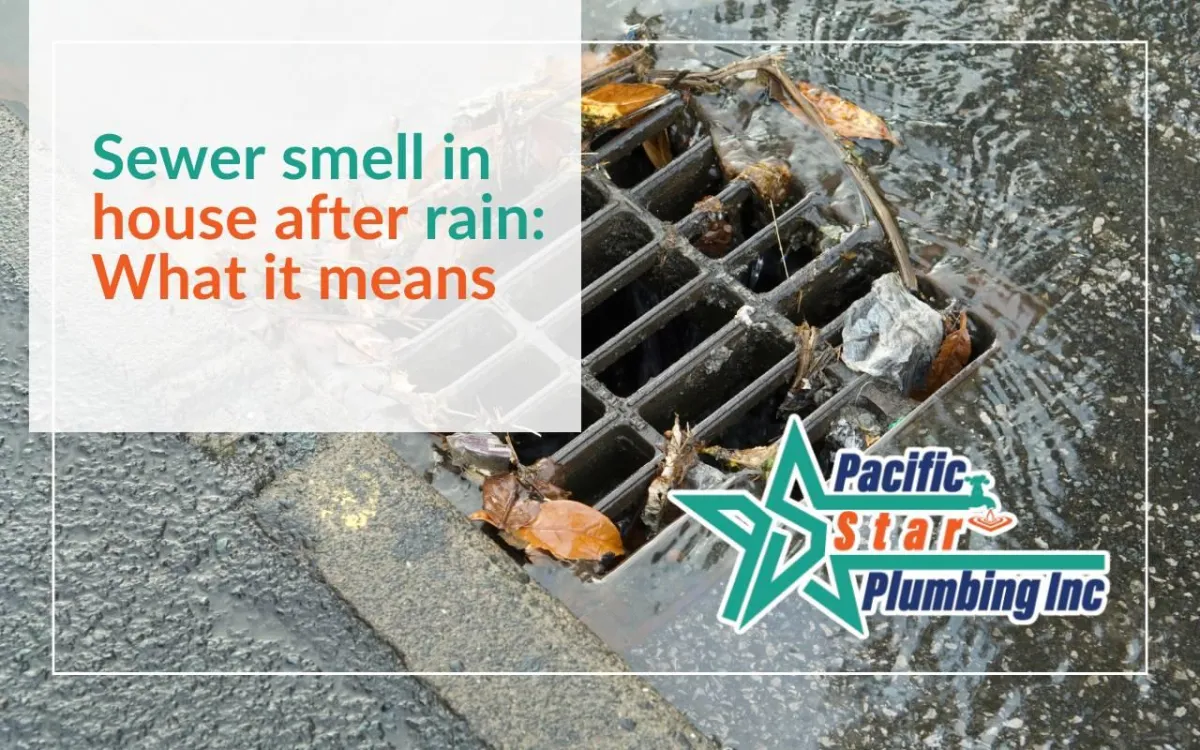
Sewer smell in house after rain: What it means
Encountering a sewer smell in your house after a rainstorm is not only unpleasant but can also be a sign of deeper plumbing issues. No one wants their home to turn into an olfactory nightmare, and air fresheners only mask the problem temporarily.
This persistent odor could be a sign of a clogged vent pipe or a sewer gas leak—both requiring immediate attention. Ignoring these signals can lead to health risks and expensive repairs down the road.
Think of it as your home trying to tell you something important. Regular maintenance and awareness of your plumbing system help prevent these odor-related woes and keep your home smelling fresh, even after heavy rain.
Importance of Addressing Sewer Smells
Dealing with a sewer smell in the house after rain as soon as you notice it is crucial for both comfort and health. Lingering odors can indicate moisture buildup, mold growth, or trapped gases that shouldn’t circulate indoors.
Quick action prevents structural damage to walls, floors, and ceilings. Spraying air freshener might offer momentary relief—but it won’t solve the root problem.
Why You Should Act Quickly:
Protect indoor air quality: Sewer gases contain harmful compounds like methane and hydrogen sulfide.
Prevent property damage: Moisture buildup can lead to mold and rot.
Save on costly repairs: Fixing minor leaks or seals is far cheaper than repairing water damage.
By identifying the true cause—whether it’s a blocked vent or a faulty trap—you preserve your home’s integrity and avoid long-term health risks. Schedule a Drainage system inspection as soon as odors arise to ensure everything is functioning safely.
Signs and Symptoms of Sewer Smell After Rain
Spotting early warning signs helps you act before the situation worsens. Common symptoms include a persistent rotten-egg smell, damp patches on walls or floors, or noticeable odor changes after rainfall.
Typical Warning Signs:
Rotten or sulfur odor: Indicates trapped sewer gases in the system.
Gurgling sounds: Suggest pressure issues or partial blockages in drains.
Slow draining sinks or tubs: Can mean debris or air is restricting water flow.
Water backup: A clear signal that the main line may be clogged.
If the smell intensifies after heavy rain, water may be overwhelming your sewer lines or vent pipes. Keep a simple log noting where and when odors occur to help plumbers diagnose the issue faster during an inspection.
Common Causes of Sewer Smell in House
Several issues can cause sewer odors after rain, but most stem from a few primary sources.
Main Causes of Sewer Odors:
Blocked main sewer line: Debris, grease, or tree roots obstructing flow.
Damaged pipe seals: Broken seals at toilets or drains allow gas to escape.
Dry P-traps: Evaporated water in unused drains removes the gas barrier.
Clogged roof vents: Leaves or nests can trap gases, forcing them indoors.
Recognizing these causes early allows for simple solutions like refilling traps or clearing vent obstructions before they escalate into major problems.
Impact of Clogged Vent Pipes on Sewer Smells
Vent pipes balance air pressure and allow sewer gases to escape above your roof. When they’re blocked, gases are pushed back into your home instead of venting outside.
You may notice odors in bathrooms or kitchens first. Clear roof vents regularly, especially after storms, to prevent pressure imbalances and odor buildup. If you can’t safely access your roof, schedule a professional Drainage system inspection for peace of mind.
Dangers of Ignoring Sewer Odors
Ignoring a sewer smell after rain can cause more than discomfort—it can affect your health. Sewer gases like methane and hydrogen sulfide cause dizziness, headaches, and nausea when inhaled for long periods.
Lingering moisture can also encourage mold growth, damaging wood, drywall, and insulation. Over time, corrosion may eat away at metal pipes, leading to leaks or bursts. Address odors promptly to protect both your home and your family’s well-being.
Detecting a Potential Sewer Gas Leak
When odors become overpowering, you might be facing a sewer gas leak. Look for cracks around pipe joints, wet spots near drains, or soft patches in your yard over underground lines.
If you suspect a leak, ventilate the area immediately by opening windows, then contact a licensed plumber for a professional inspection. Experts use cameras and gas detectors to pinpoint leaks accurately and repair them without unnecessary digging.
Steps to Take When Noticing Sewer Smell After Rain
Reacting quickly keeps damage and odors under control. Start by identifying where the smell is strongest—typically in bathrooms, basements, or kitchens.
Immediate Actions to Take:
Refill dry drains: Pour water into unused sinks and showers to restore P-traps.
Check for leaks: Look under sinks and around toilets for drips or pooling water.
Inspect vent openings: Ensure roof vents aren’t clogged by leaves or debris.
Call a plumber: If odors persist, schedule a professional inspection.
Providing your plumber with details about when the smell appears—especially after rainfall—helps pinpoint whether the cause is a vent blockage, pipe leak, or deeper sewer issue.
Preventive Maintenance to Avoid Sewer Smells
Regular plumbing maintenance can drastically reduce the chance of sewer smells appearing after rain. Simple monthly habits can make a big difference.
Easy Prevention Tips:
Keep P-traps filled: Pour water down unused drains once a month.
Use enzyme cleaners: Break down buildup naturally without harsh chemicals.
Inspect roof vents: Clear out leaves, nests, or other debris twice a year.
Schedule annual inspections: Have professionals check seals, vents, and sewer lines.
These steps ensure smooth water flow, protect your pipes, and keep unwanted odors from sneaking into your living spaces.
Professional Help for Persistent Sewer Odors
When DIY solutions don’t work, call in licensed professionals. Plumbers have specialized equipment—like drain cameras and gas detectors—to locate blockages or leaks accurately.
Be sure to describe when and where the smell appears and note any past plumbing issues. A professional Drainage system inspection ensures lasting results and helps you avoid recurring sewer odors for good.
FAQs About Sewer Smell in House After Rain
Why does my house smell like sewer after heavy rain?
It’s usually due to a blocked vent pipe or dry P-traps allowing sewer gases to escape indoors.
Can sewer gas be harmful to my health?
Yes. Long-term exposure can cause headaches, dizziness, and respiratory irritation.
What should I do first when I smell sewer odors?
Check drains for blockages or dry traps, then contact a professional plumber for an inspection.
How can I prevent sewer smells in the future?
Keep drains filled, inspect vents regularly, and schedule annual plumbing maintenance.
When should I call a plumber?
If odors persist after basic maintenance or worsen after rain, contact a licensed professional immediately.
Keeping Your Home Fresh and Safe
Addressing sewer smells promptly protects your health and your property. Understanding the common causes—like vent clogs or dry traps—and knowing when to seek professional Drainage system inspection keeps your home safe and odor-free.
Stay proactive with regular maintenance, and don’t hesitate to Contact us for expert help. With consistent care, your home will remain fresh, comfortable, and welcoming, rain or shine.








